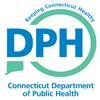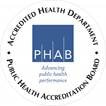It's Worth It Newsletter Spring 2021
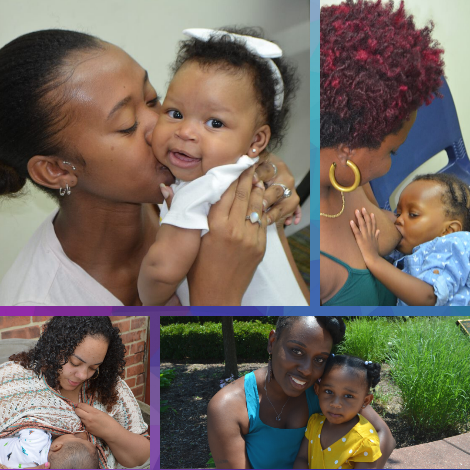
Welcome to the spring 2021 edition of Connecticut Department of Public Health's Breastfeeding: It's Worth It! eNewsletter!
This eNewsletter will help keep you up to date on current projects, opportunities, events, and outcomes related to breastfeeding promotion and support within our state.
This eNewsletter is produced in collaboration with a variety of stakeholders with funding from the Centers for Disease and Control and Prevention’s (CDC) State Physical Activity and Nutrition (SPAN) Program. DPH is funded by SPAN to implement breastfeeding promotion and support activities in healthcare, communities and workplaces through 2023.
This eNewsletter will help keep you up to date on current projects, opportunities, events, and outcomes related to breastfeeding promotion and support within our state.
This eNewsletter is produced in collaboration with a variety of stakeholders with funding from the Centers for Disease and Control and Prevention’s (CDC) State Physical Activity and Nutrition (SPAN) Program. DPH is funded by SPAN to implement breastfeeding promotion and support activities in healthcare, communities and workplaces through 2023.
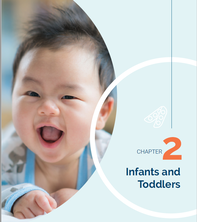
New USDA Dietary Guidelines for Americans
The United States Department of Agriculture (USDA) recently released the 2020-2025 Dietary Guidelines for Americans (DGA). "The Dietary Guidelines for Americans provide science-based advice to help everyone—no matter their age, race, socioeconomic, or health status—achieve better health by making every bite count." -USDA infographic
For the first time in it's 30 year history, the DGA now includes recommendations for infants and toddlers! This is a historic milestone.
A key recommendation is to exclusively feed infants human milk for about the first six months of life continuing through at least the first year of life, and longer if desired. At about six months, infants should be introduced to complementary foods that are nutrient dense and low in sugar and sodium. If human milk is not available, infants should be fed iron fortified, commercial infant formula.
Learn more about the DGA: www.dietaryguidelines.gov
The United States Department of Agriculture (USDA) recently released the 2020-2025 Dietary Guidelines for Americans (DGA). "The Dietary Guidelines for Americans provide science-based advice to help everyone—no matter their age, race, socioeconomic, or health status—achieve better health by making every bite count." -USDA infographic
For the first time in it's 30 year history, the DGA now includes recommendations for infants and toddlers! This is a historic milestone.
A key recommendation is to exclusively feed infants human milk for about the first six months of life continuing through at least the first year of life, and longer if desired. At about six months, infants should be introduced to complementary foods that are nutrient dense and low in sugar and sodium. If human milk is not available, infants should be fed iron fortified, commercial infant formula.
Learn more about the DGA: www.dietaryguidelines.gov
Healthcare
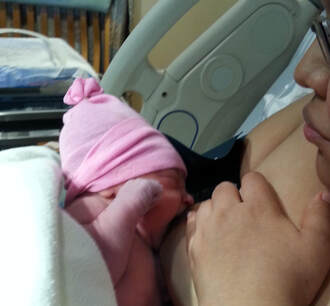
Maternity Care Practices in Infant Nutrition and Care Survey (mPINC) and the mPINC During COVID-19 Supplement.
CDC’s national survey of Maternity Practices in Infant Nutrition and Care (mPINC) assesses maternity care practices and provides feedback to encourage hospitals to make improvements that better support breastfeeding. About every 2 years, CDC invites all hospitals across the country to complete the mPINC survey. The most recent survey, in 2018, can be found here: https://www.cdc.gov/breastfeeding/data/mpinc/national-report.html. The survey questions focus on specific parts of hospital maternity care that affect how babies are fed including hospital policies, staff training, immediate skin-to-skin contact, early and frequent breastfeeding, teaching about breastfeeding, exclusive breastfeeding, rooming-in, and follow-up after discharge.
During the pandemic, CDC conducted an mPINC supplemental survey, Hospital maternity care practices and breastfeeding support in the context of the COVID-19 pandemic — U.S. states and territories, July 15–August 20, 2020, to gauge coronavirus disease 2019 (COVID-19) impacts on both state and national hospital breastfeeding practices. The supplemental survey showed that hospitals have developed different protocols for new mothers who are suspected or confirmed to have COVID-19. Overall, the majority of hospitals both in Connecticut and nationally, jointly decided with each mother if she wanted skin-to-skin contact, rooming-in, and/or to breastfeed. Below is a summary of how breastfeeding support practices were implemented for mothers with confirmed/suspected COVID-19 in Connecticut hospitals.
The supplemental survey found that direct breastfeeding was encouraged with precautions (e.g., mask, handwashing) by many Connecticut hospitals (58.8%), and when not directly breastfeeding, all hospitals reported supporting new mothers to start expressing breast milk within the first 1-6 hours after birth. In addition, most (82.4%) Connecticut hospitals reported that post-discharge breastfeeding support was offered virtually, with in-person consultations still being offered by many hospitals (58.8%). Finally, most Connecticut hospitals (88.2%) reported that their exclusive breastfeeding rates either increased or stayed about the same during the time of this survey.
CDC’s national survey of Maternity Practices in Infant Nutrition and Care (mPINC) assesses maternity care practices and provides feedback to encourage hospitals to make improvements that better support breastfeeding. About every 2 years, CDC invites all hospitals across the country to complete the mPINC survey. The most recent survey, in 2018, can be found here: https://www.cdc.gov/breastfeeding/data/mpinc/national-report.html. The survey questions focus on specific parts of hospital maternity care that affect how babies are fed including hospital policies, staff training, immediate skin-to-skin contact, early and frequent breastfeeding, teaching about breastfeeding, exclusive breastfeeding, rooming-in, and follow-up after discharge.
During the pandemic, CDC conducted an mPINC supplemental survey, Hospital maternity care practices and breastfeeding support in the context of the COVID-19 pandemic — U.S. states and territories, July 15–August 20, 2020, to gauge coronavirus disease 2019 (COVID-19) impacts on both state and national hospital breastfeeding practices. The supplemental survey showed that hospitals have developed different protocols for new mothers who are suspected or confirmed to have COVID-19. Overall, the majority of hospitals both in Connecticut and nationally, jointly decided with each mother if she wanted skin-to-skin contact, rooming-in, and/or to breastfeed. Below is a summary of how breastfeeding support practices were implemented for mothers with confirmed/suspected COVID-19 in Connecticut hospitals.
The supplemental survey found that direct breastfeeding was encouraged with precautions (e.g., mask, handwashing) by many Connecticut hospitals (58.8%), and when not directly breastfeeding, all hospitals reported supporting new mothers to start expressing breast milk within the first 1-6 hours after birth. In addition, most (82.4%) Connecticut hospitals reported that post-discharge breastfeeding support was offered virtually, with in-person consultations still being offered by many hospitals (58.8%). Finally, most Connecticut hospitals (88.2%) reported that their exclusive breastfeeding rates either increased or stayed about the same during the time of this survey.
Community Support
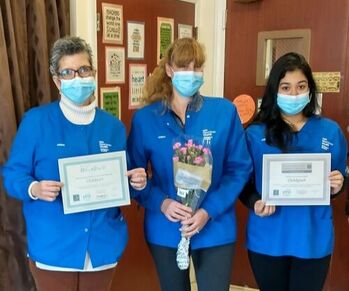
Congratulations to Childport Child Care Center!
Childport has become the first child care program in Connecticut to become recognized as a “Breastfeeding Friendly Child Care Program” by the Connecticut Breastfeeding Coalition (CBC). Congratulations and a huge thanks to Ruth Kenneth, Vivian Laste and Alyssa Batres for their incredible work to achieve this recognition! Also, a big thanks to Childport Manager Chantel Dipronio (not pictured) and Liz Parmelee, CES Early Childhood Specialist who provided them with technical assistance as part of the Go NAPSACC program.
Being a Breastfeeding Friendly Child Care Program lets families know that your staff will support their feeding goals. Join Childport and become the next Breastfeeding Friendly Child Care Program! To learn more about how Go NAPSACC works with child care providers to help improve the health and well-being of young children, click here. Or, if you are ready to apply for the recognition, please visit the CBC website here.
Childport has become the first child care program in Connecticut to become recognized as a “Breastfeeding Friendly Child Care Program” by the Connecticut Breastfeeding Coalition (CBC). Congratulations and a huge thanks to Ruth Kenneth, Vivian Laste and Alyssa Batres for their incredible work to achieve this recognition! Also, a big thanks to Childport Manager Chantel Dipronio (not pictured) and Liz Parmelee, CES Early Childhood Specialist who provided them with technical assistance as part of the Go NAPSACC program.
Being a Breastfeeding Friendly Child Care Program lets families know that your staff will support their feeding goals. Join Childport and become the next Breastfeeding Friendly Child Care Program! To learn more about how Go NAPSACC works with child care providers to help improve the health and well-being of young children, click here. Or, if you are ready to apply for the recognition, please visit the CBC website here.
Share Your Story
We want to hear from everyone who has a breastfeeding (It’s Worth It!) story: Parents (moms, dads, and those who identify as either or more), grandparents, health providers, clinical professionals, employers and policy makers. Even though many moms and babies can face breastfeeding challenges, with community support you can overcome those challenges and thrive. Like many moms we have talked to over the years, it’s not always easy, but breastfeeding - It’s Worth It! Your personal story can make a difference to another family. We are in this together and there is a community in CT of families who can encourage each other. Submit your stories here.
We want to hear from everyone who has a breastfeeding (It’s Worth It!) story: Parents (moms, dads, and those who identify as either or more), grandparents, health providers, clinical professionals, employers and policy makers. Even though many moms and babies can face breastfeeding challenges, with community support you can overcome those challenges and thrive. Like many moms we have talked to over the years, it’s not always easy, but breastfeeding - It’s Worth It! Your personal story can make a difference to another family. We are in this together and there is a community in CT of families who can encourage each other. Submit your stories here.
Workplace Lactation Accommodation
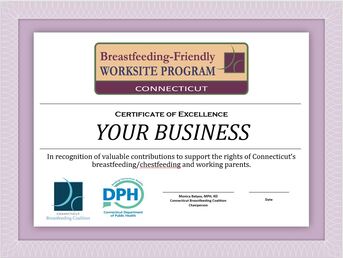
Help Connecticut Make it Work! Become a Breastfeeding-Friendly Worksite
Breastfeeding and working do go together! Ensuring that employees have what they need to continue breastfeeding/chestfeeding when they return to work after the birth of a child is good for an employer’s bottom line! Reduced employee turnover rates and lower health care costs are just two benefits. Working together, employees and employers are often able to find solutions that work well for everyone. Check out these short YouTube videos from the CBC with ideas for Employers and Employees.
State and federal laws protect a parent's right to express milk at work during breaks in a clean, private place that is not a restroom. Our partners at the CBC can help you to ensure that your worksite is compliant with these laws, and in the process your worksite can achieve state-wide recognition as a Breastfeeding Friendly Worksite! The application is online and easier than you may think. Contact the CBC if you have any questions, [email protected], 203-699-MILK (6455)
Congratulations to Backus and Windham Hospitals and Childport child care center for achieving this recognition in January 2021.
Breastfeeding Workplace Rights during COVID-19
The pandemic has raised many questions for expecting and new mothers about their workplace rights to breastfeed and/or express their milk. The Break Time for Nursing Mothers Law and the Pregnancy Discrimination Act are still being enforced. Mothers have the right to a safe, clean non-bathroom location to pump and a place to properly store their breastmilk. Work with your employer to ensure increased measures are taken to have a clean, safe, non-bathroom location at your workplace to pump during the pandemic. Talk with your doctor about their recommendations on safely nursing your baby which can help provide you direction when talking with your employer about making breastfeeding/pumping accommodations. If you are working or considering working from home during the pandemic, discuss times when you can turn off your camera to breastfeed or pump at home.
To learn more about your workplace rights during COVID-19, click here to read this pdf document or watch this YouTube video:
Breastfeeding and working do go together! Ensuring that employees have what they need to continue breastfeeding/chestfeeding when they return to work after the birth of a child is good for an employer’s bottom line! Reduced employee turnover rates and lower health care costs are just two benefits. Working together, employees and employers are often able to find solutions that work well for everyone. Check out these short YouTube videos from the CBC with ideas for Employers and Employees.
State and federal laws protect a parent's right to express milk at work during breaks in a clean, private place that is not a restroom. Our partners at the CBC can help you to ensure that your worksite is compliant with these laws, and in the process your worksite can achieve state-wide recognition as a Breastfeeding Friendly Worksite! The application is online and easier than you may think. Contact the CBC if you have any questions, [email protected], 203-699-MILK (6455)
Congratulations to Backus and Windham Hospitals and Childport child care center for achieving this recognition in January 2021.
Breastfeeding Workplace Rights during COVID-19
The pandemic has raised many questions for expecting and new mothers about their workplace rights to breastfeed and/or express their milk. The Break Time for Nursing Mothers Law and the Pregnancy Discrimination Act are still being enforced. Mothers have the right to a safe, clean non-bathroom location to pump and a place to properly store their breastmilk. Work with your employer to ensure increased measures are taken to have a clean, safe, non-bathroom location at your workplace to pump during the pandemic. Talk with your doctor about their recommendations on safely nursing your baby which can help provide you direction when talking with your employer about making breastfeeding/pumping accommodations. If you are working or considering working from home during the pandemic, discuss times when you can turn off your camera to breastfeed or pump at home.
To learn more about your workplace rights during COVID-19, click here to read this pdf document or watch this YouTube video:
Resources and Research

New CERPs & CEUs Resource List
The Connecticut Breastfeeding Coalition has compiled a list of free and low-cost continuing education opportunities for lactation professionals. These webinars and courses are available on-demand and can be completed online in the comfort of your home or office. A variety of community and clinical topics are available. Click here to download the pdf.
Recent Journal Article of Interest
Racial Disparities in Sustaining Breastfeeding in a Baby-Friendly Designated Southeastern United States Hospital: An Opportunity to Investigate Systemic Racism
Address and help to reduce the racial gap in breastfeeding by implementing the Baby-Friendly Hospital Initiative (BFHI). Over the years, systemic racism has greatly impacted black mothers in healthcare. White mothers are more likely than black mothers to be encouraged to breastfeed by their doctors. This study shows how using the BFHI program to establish standardized protocols has increased the number of black mothers who initiated breastfeeding at the hospital from 52% to 66%. Hospitals that establish the BFHI program are taking a step in the right direction in reducing the racial gap in breastfeeding, but need to continue working together to take further action to remove systemic racism from healthcare.
The Connecticut Breastfeeding Coalition has compiled a list of free and low-cost continuing education opportunities for lactation professionals. These webinars and courses are available on-demand and can be completed online in the comfort of your home or office. A variety of community and clinical topics are available. Click here to download the pdf.
Recent Journal Article of Interest
Racial Disparities in Sustaining Breastfeeding in a Baby-Friendly Designated Southeastern United States Hospital: An Opportunity to Investigate Systemic Racism
Address and help to reduce the racial gap in breastfeeding by implementing the Baby-Friendly Hospital Initiative (BFHI). Over the years, systemic racism has greatly impacted black mothers in healthcare. White mothers are more likely than black mothers to be encouraged to breastfeed by their doctors. This study shows how using the BFHI program to establish standardized protocols has increased the number of black mothers who initiated breastfeeding at the hospital from 52% to 66%. Hospitals that establish the BFHI program are taking a step in the right direction in reducing the racial gap in breastfeeding, but need to continue working together to take further action to remove systemic racism from healthcare.
If you have received this link from a friend or colleague, please subscribe below:
The Connecticut State Physical Activity and Nutrition Program is made possible with funding from the Centers for Disease Control and Prevention (CDC). The views expressed in this eBulletin do not necessarily reflect the official policies of the CDC or imply endorsement by the U.S. Government. Learn more about the State Physical Activity and Nutrition Program at https://www.cdc.gov/nccdphp/dnpao/.


